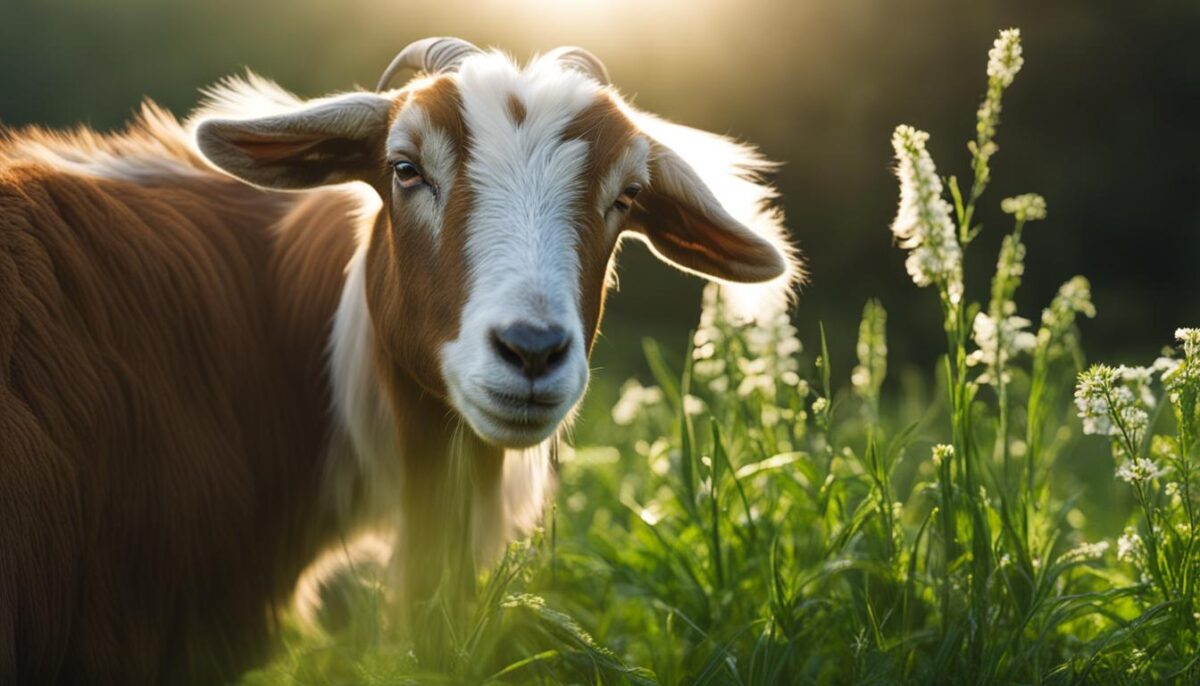Goat foaming at the mouth and throwing up can be a cause for concern for goat owners. It is important to understand the signs, causes, and effective treatments for this issue to protect the health of your livestock. Frothy bloat is a common cause of goat foaming at the mouth and is usually caused by overeating lush, damp feed such as clover, alfalfa, or legume pastures. Bloat can be life-threatening for goats as it can lead to respiratory or circulatory failure. Other possible causes of goat foaming at the mouth include poisoning, excessive salivation, uneven teeth, and certain diseases. Timely veterinary care is essential to diagnose the underlying cause and implement appropriate treatment for your goats.
Key Takeaways:
- Goat foaming at the mouth and throwing up can indicate various health issues
- Frothy bloat is a common cause, often due to overeating lush, damp feed
- Other potential causes include poisoning, excessive salivation, and certain diseases
- Timely veterinary care is crucial for accurate diagnosis and effective treatment
- Preventive measures can help minimize the risk of goat foaming at the mouth and throwing up
Symptoms of Goat Foaming at Mouth and Throwing Up
When a goat is foaming at the mouth and throwing up, several noticeable symptoms can indicate a health issue. It is important to be aware of these symptoms to promptly address any potential problems and ensure the well-being of your goats.
Some common symptoms of goat foaming at the mouth and throwing up include:
- Lack of appetite
- Discomfort
- Abdominal inflation on the left side
- Pain in the facial muscles
- Grinding of teeth
- Kicking the belly
- Frequent urination
- Stilted walk
- Difficulty breathing
- Lying down
If you observe any of these symptoms in your goats, it is crucial to take prompt action and seek veterinary assistance. These symptoms can indicate various health issues, and timely veterinary care is essential to accurately diagnose the underlying cause and provide appropriate treatment.
Causes of Goat Foaming at Mouth and Throwing Up
When a goat is foaming at the mouth and throwing up, there can be several causes for this concerning behavior. Understanding these causes is crucial in addressing the issue and providing appropriate treatment for your goats. The main causes of goat foaming at mouth and throwing up include:
- Frothy Bloat: Overeating lush, damp feed such as clover, alfalfa, or legume pastures can lead to frothy bloat in goats. This occurs when gas bubbles become trapped in the rumen, causing discomfort and potentially life-threatening complications.
- Poisoning: Ingesting toxic plants or contaminated food can result in poisoning, leading to foaming at the mouth and vomiting in goats.
- Excessive Salivation: Certain dental issues or diseases can cause goats to produce excessive saliva, resulting in foaming at the mouth.
- Uneven Teeth: Misaligned or overgrown teeth can hinder a goat’s ability to properly chew and digest food, leading to digestive issues such as foaming at the mouth.
- Other Diseases: In some cases, goat foaming at mouth and throwing up can be symptoms of underlying diseases such as listeriosis or rabies.
It is essential to consult with a veterinarian to accurately diagnose the underlying cause of your goats’ symptoms and determine the most appropriate course of treatment.
| Cause | Symptoms |
|---|---|
| Frothy Bloat | Excessive foam production, difficulty breathing, abdominal distension |
| Poisoning | Vomiting, diarrhea, weakness, neurological symptoms |
| Excessive Salivation | Constant drooling, foaming at the mouth, difficulty eating or swallowing |
| Uneven Teeth | Poor appetite, weight loss, difficulty chewing |
| Other Diseases | Additional symptoms may vary depending on the specific disease |
“It is essential to consult with a veterinarian to accurately diagnose the underlying cause of your goats’ symptoms and determine the most appropriate course of treatment.”
Preventing Goat Foaming at Mouth and Throwing Up
Although goat foaming at mouth and throwing up cannot be completely prevented, there are measures you can take to minimize the risk:
- Provide a balanced diet: Avoid overfeeding lush, damp feed and ensure your goats have access to a variety of long-fiber forage such as hay or pasture.
- Maintain good dental health: Regularly check your goats’ teeth and address any unevenness or overgrowth promptly.
- Monitor goat health: Conduct regular health checks and promptly address any signs of illness or discomfort.
- Practice good hygiene: Keep your goats’ living environment clean and ensure proper sanitation to prevent the ingestion of harmful substances.
By implementing these preventive measures and staying vigilant in monitoring your goats’ health, you can reduce the likelihood of foaming at the mouth and throwing up.
Treatment for Goat Foaming at Mouth and Throwing Up
When a goat is foaming at the mouth and throwing up, it is crucial to provide timely treatment to address the underlying cause of the issue and promote the goat’s recovery. Veterinary care is essential in accurately diagnosing the problem and implementing an appropriate treatment plan. Depending on the severity and cause of the condition, various remedies and interventions may be recommended.
One possible treatment for goats experiencing foaming at the mouth and throwing up is the administration of antifoaming agents. These agents help break down the foam in the goat’s digestive system, reducing the discomfort and releasing trapped gas. It is important to consult with a veterinarian to determine the appropriate dosage and administration method for the antifoaming agent.
In more severe cases, emergency surgery called rumenotomy may be necessary. Rumenotomy involves surgically opening the rumen, the goat’s large fermentation chamber, to release the excess gas and alleviate bloat. This procedure should only be performed by a skilled veterinarian and is typically reserved for life-threatening situations where other treatments have failed.
Alongside veterinary care, it is essential to provide supportive care for the goat during the treatment process. This may involve adjusting the goat’s diet to reduce the risk of bloat, ensuring they have access to clean water and suitable shelter, and closely monitoring their progress. The veterinarian will provide guidance on any specific care instructions and follow-up treatments that may be necessary.

Table: Common Treatment Options for Goat Foaming at Mouth and Throwing Up
| Treatment | Description |
|---|---|
| Antifoaming agents | Administered to break down foam and release trapped gas in the goat’s digestive system. |
| Rumenotomy | Emergency surgery to open the rumen and alleviate bloat by releasing excess gas. |
| Supportive care | Includes adjusting the goat’s diet, providing clean water and suitable shelter, and closely monitoring their progress. |
It is important to note that the specific treatment for goat foaming at the mouth and throwing up may vary depending on the individual goat, the underlying cause, and the veterinarian’s recommendations. Therefore, it is crucial to seek professional veterinary advice to ensure the appropriate treatment plan is implemented for the best possible outcome.
Preventing Goat Foaming at Mouth and Throwing Up
Preventing goat foaming at the mouth and throwing up is crucial for maintaining the health and well-being of your livestock. While it may not be possible to prevent all instances of this issue, taking certain precautions can help minimize the risk. Here are some essential steps you can take to prevent goat foaming at the mouth and throwing up:
1. Provide a Balanced Diet
Ensuring that your goats have a balanced and suitable diet is key to preventing foaming at the mouth and throwing up. Avoid overfeeding lush, damp feed such as clover, alfalfa, or legume pastures, as this can lead to frothy bloat. Instead, provide a variety of long-fiber forage such as hay or pasture to promote healthy digestion.
2. Monitor Goat Health
Regularly monitoring your goats’ health is essential in preventing potential issues. Keep an eye out for any signs of discomfort or illness, such as a lack of appetite or abnormal behavior. Promptly address any signs of illness or discomfort and seek veterinary assistance when necessary.
3. Practice Good Husbandry
Implementing good husbandry practices can go a long way in preventing goat foaming at the mouth and throwing up. This includes providing clean and suitable shelter for your goats, maintaining a clean environment, and practicing proper sanitation measures to reduce the risk of contamination or disease transmission.
4. Seek Veterinary Guidance
Consulting with a veterinarian is crucial in managing the health of your goats and preventing foaming at the mouth and throwing up. A veterinarian can provide expert advice on nutrition, preventive care, and overall goat management. Regular veterinary check-ups and vaccinations are essential in maintaining the health and well-being of your livestock.
By following these preventive measures and staying proactive in goat health management, you can minimize the risk of goat foaming at the mouth and throwing up. Remember, early intervention and veterinary care are key in ensuring the health and well-being of your goats.
Understanding Goat Health Issues and Management
Keeping your goats healthy requires a good understanding of common health issues and effective management strategies. By implementing proper goat management practices, you can minimize the risk of health problems and ensure the well-being of your livestock.
Common Goat Health Issues
Goats are susceptible to various health issues, including parasitic infections, respiratory diseases, foot problems, and nutritional deficiencies. Regular health checks and vaccinations are essential to detect and prevent these issues. Additionally, controlling parasites through proper deworming protocols can help maintain the overall health of your goats.
Effective Goat Management
Proper goat management is crucial for maintaining the health and productivity of your livestock. This includes providing a balanced diet that meets their nutritional needs, consisting of high-quality forage, grains, and minerals. Adequate shelter, clean water, and a clean environment are also important factors in goat management.
Regular grooming, such as hoof trimming and shearing, can help prevent foot problems and promote good hygiene. Additionally, practicing biosecurity measures, such as quarantine protocols for new animals, can help prevent the spread of diseases within your herd.
Consulting with a Veterinarian
While proper goat management practices can go a long way in preventing health issues, it is important to consult with a veterinarian for expert advice and guidance. A veterinarian can provide specific recommendations based on your goat’s individual needs and help you develop a customized health management plan.
Remember, early detection and prompt veterinary care are key to addressing any health issues that may arise. Regular check-ups, vaccinations, and consultations with a knowledgeable veterinarian will help ensure that your goats remain healthy and thrive.
Importance of Timely Veterinary Care for Sick Goats
When dealing with sick goats, timely veterinary care is of utmost importance. Sick goats require immediate attention and professional diagnosis to ensure proper treatment and prevent further health complications. Veterinary care plays a crucial role in addressing goat health issues and providing effective treatment for various illnesses.
Veterinarians are trained professionals with extensive knowledge and experience in diagnosing and treating goat illnesses. They have the expertise to accurately identify the underlying cause of a goat’s symptoms, whether it’s foaming at the mouth, throwing up, or any other health issue. Timely veterinary intervention can prevent the condition from worsening and potentially save the goat’s life.
Goat health issues can range from frothy bloat to poisoning and diseases. Without proper veterinary care, these conditions can escalate rapidly and have devastating consequences for the goat’s well-being. Veterinarians have access to advanced diagnostic tools and treatment options specific to goats, enabling them to provide the best care possible.
The Role of Veterinary Care in Treatment for Goat Illness
Veterinary care goes beyond just diagnosing an issue; it also involves developing an appropriate treatment plan tailored to the goat’s specific needs. Treatment may include medications, surgical procedures, dietary adjustments, and supportive care, all of which require professional guidance and supervision.
Additionally, veterinarians can provide valuable advice on preventive measures to maintain the overall health and well-being of goats. Regular check-ups, vaccinations, and parasite control are crucial aspects of goat care that veterinarians can oversee. By seeking veterinary care for sick goats and following their recommendations, you can ensure the best possible outcomes for your herd.
Steps for Emergency Care for a Goat Foaming at Mouth and Throwing Up
In cases of emergency, quick action is crucial when dealing with a goat foaming at the mouth and throwing up. Follow these steps to provide immediate care for your goat:
- Contact a veterinarian: As soon as you notice your goat showing these symptoms, call a veterinarian for assistance. They can provide guidance and instructions on how to proceed.
- Isolate the goat: Move the affected goat to a clean, quiet, and well-ventilated area where it can be monitored and receive necessary care without spreading any potential infections to other animals.
- Offer water: Provide fresh, clean water to the goat to prevent dehydration. However, avoid offering any food until advised by the veterinarian.
- Maintain calm and comfort: Keep the goat comfortable and minimize stress by avoiding loud noises or sudden movements. Stay by the goat’s side to provide reassurance and support until veterinary assistance arrives.
Remember, each emergency situation may require specific actions depending on the goat’s condition and the underlying cause of the issue. It is essential to follow the guidance of a veterinarian and provide the necessary care to ensure the well-being of your goat.
“Quick action and timely veterinary care are crucial when responding to a goat foaming at the mouth and throwing up. By following the steps provided and seeking professional assistance, you can improve the chances of a positive outcome for your goat.”
Potential Risks and Precautions
It is important to approach emergency situations with caution to avoid potential risks. Here are some considerations to keep in mind:
- Personal safety: When handling a distressed goat, be mindful of your own safety. Avoid placing yourself in situations where you may be at risk of injury, especially if the goat is agitated or in pain.
- Transportation: If the goat needs to be transported to a veterinary facility, ensure that it is done safely and securely. Use appropriate restraints or equipment to prevent further harm to the goat or yourself during transportation.
- Follow veterinarian’s instructions: Adhere to the instructions and recommendations provided by the veterinarian. They have the expertise and knowledge to guide you through the emergency care process effectively.
By being prepared and taking prompt action, you can provide the necessary emergency care for a goat foaming at the mouth and throwing up. Remember, the well-being of your goat is the top priority, and seeking veterinary assistance is key to ensuring their health and recovery.

Conclusion
Foaming at the mouth and throwing up in goats can be a symptom of various health issues that require timely veterinary care. It is crucial to accurately diagnose the underlying cause and provide appropriate treatment to ensure the well-being of your livestock.
Preventive measures play a key role in minimizing the risk of goat foaming at the mouth and throwing up. Maintaining a balanced diet for your goats, avoiding overfeeding lush and damp feed, and providing regular veterinary care are important steps in goat health management.
By staying vigilant and proactive, you can protect your goats from potential issues and promote their overall health. Remember to monitor your goats’ symptoms, seek veterinary assistance when necessary, and follow the recommended treatment plan. With proper care and attention, you can help your goats thrive and maintain their optimal health.
FAQ
What are the symptoms of a goat foaming at the mouth and throwing up?
Symptoms may include a lack of appetite, discomfort, abdominal inflation on the left side, pain in the facial muscles, grinding of teeth, kicking the belly, frequent urination, stilted walk, difficulty breathing, and even lying down.
What are the possible causes of goat foaming at the mouth and throwing up?
The common causes include frothy bloat from overeating lush, damp feed, poisoning, excessive salivation, uneven teeth, and certain diseases.
How can goat foaming at the mouth and throwing up be treated?
Treatment depends on the underlying cause and may include emergency surgery called rumenotomy or administering antifoaming agents to break down the foam and release trapped gas.
What can be done to prevent goat foaming at the mouth and throwing up?
Preventive measures include providing a balanced diet, avoiding overfeeding of lush, damp feed, monitoring your goats’ health, and ensuring regular veterinary care.
What other health issues should goat owners be aware of?
Other common goat health issues include regular health checks, vaccinations, parasite control, proper nutrition, suitable shelter, and maintaining a clean environment.
Why is timely veterinary care important for sick goats?
Veterinary care is crucial for accurately diagnosing the underlying cause of the issue and providing appropriate treatment. Delaying care can lead to worsened conditions and potentially fatal outcomes.
What steps should be taken for emergency care of a goat foaming at the mouth and throwing up?
Contacting a veterinarian immediately and following their guidance is crucial. In some cases, emergency procedures may be necessary. Maintaining calm and providing necessary support are also important.
How important is veterinary assistance for goat health?
Timely veterinary care is essential for maintaining goat health. Regular check-ups, vaccinations, and consultations with a knowledgeable veterinarian can help prevent potential issues.


